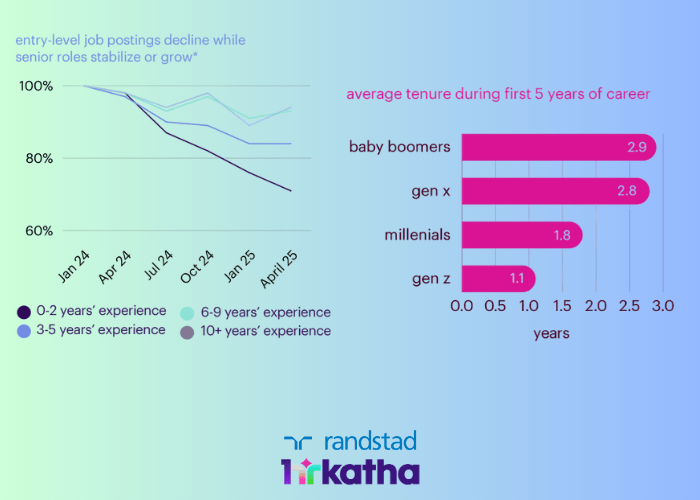By Sarbojit Mallick
The tech hiring landscape is undergoing a massive transformation. As new technologies and shifting work patterns emerge, professionals face both challenges and opportunities in pursuing stability and growth in this dynamic field.
Skills Opening Career Doors
AI and Machine Learning are at the forefront of job growth. The World Economic Forum’s Future of Jobs Report 2025 highlights these fields as crucial, with companies across various industries racing to adopt intelligent technologies. From hospitals improving diagnoses to banks enhancing fraud detection and logistics firms optimizing delivery routes, proficiency in tools like TensorFlow or PyTorch offers immense value to employers.
As digital threats become increasingly sophisticated, Cybersecurity expertise is more vital than ever. Network Security Engineers who protect company assets command premium salaries, as highlighted by the IBM Data Breach Report, which states that the average cost of data breaches exceeds $4 million. This underscores the critical importance of security expertise as a business investment.
Moreover, a solid data infrastructure is essential for successful AI initiatives. Data Engineers who build pipelines and ensure data quality are now integral to business strategies, with companies relying on these skills to convert raw data into actionable insights for customer targeting and campaign optimization.
Tech Literacy is increasingly becoming a requirement, even for entry-level roles, necessitating familiarity with cloud platforms and automation tools. A concerning literacy gap in India, with urban centers at 61% and rural areas at 25%, highlights the growing need for basic technological fluency across all industries.
Workplace Transformation
The rise of Hybrid Work Models has erased geographic barriers, making remote collaboration a vital skill. Organizations are tapping into global talent pools, which requires new approaches to teamwork and communication. Mastery of video conferencing, project management platforms, and asynchronous communication is essential in this new environment.
With nearly 70% of current tasks susceptible to automation, as per McKinsey’s research, job roles are evolving. This trend extends beyond manufacturing to data entry, customer service, and even creative tasks. The advent of Tesla's humanoid Optimus robots signals a future where we must learn to deploy and manage AI systems rather than compete against them.
Inclusive Hiring initiatives are now a priority, as diversity fosters innovation. According to the Hire STEM Women website, 83% of employers are implementing initiatives to recruit talent regardless of gender, background, or neurodiversity, creating opportunities for previously overlooked professionals.
Career Landscape Shifts
While automation may eliminate certain jobs, it is projected to create even more, with McKinsey forecasting a net job gain of approximately 6% by 2030. Sectors like healthcare technology, renewable energy, and educational technology are on powerful growth trajectories. Professionals who adapt quickly will seize these emerging opportunities.
Most employers, about 85%, plan to invest heavily in training programs, making it vital for career strategies to leverage these resources.
Strategic Career Moves
Targeting growing fields such as renewable energy, AI, and healthcare technology is essential. Researching specialties that align with personal interests and professional backgrounds can uncover promising career paths.
Combining technical and soft skills will help candidates stand out in the job market. Employers seek professionals who blend specialized expertise with adaptability, creative problem-solving, and strong communication abilities.
Utilizing AI-powered job platforms and professional networks can enhance job searches. These networks allow direct connections with hiring managers and showcase expertise through content sharing. Demonstrating skills through projects, such as open-source contributions and hackathon participation, can convey capabilities that traditional resumes may not showcase.
Strategic networking is crucial for accessing the hidden job market, where up to 80% of positions are filled through referrals. Engaging with professional communities, industry forums, and maintaining relationships with peers and mentors can unlock these opportunities.
A T-shaped skill profile, where deep expertise in one area is complemented by broader knowledge in related fields, enhances versatility and market value.
The tech career landscape rewards those who anticipate change rather than react to it. Curiosity and continuous learning position professionals at the intersection of technology trends and market needs. Career development is not just about securing the next job but building adaptability for future transitions.
Regular conversations with recruiters—even when satisfied in current roles—provide valuable insights into emerging roles and skill requirements, informing effective long-term career planning in this ever-evolving industry.







Comments
Join Our Community
Sign up to share your thoughts, engage with others, and become part of our growing community.
No comments yet
Be the first to share your thoughts and start the conversation!